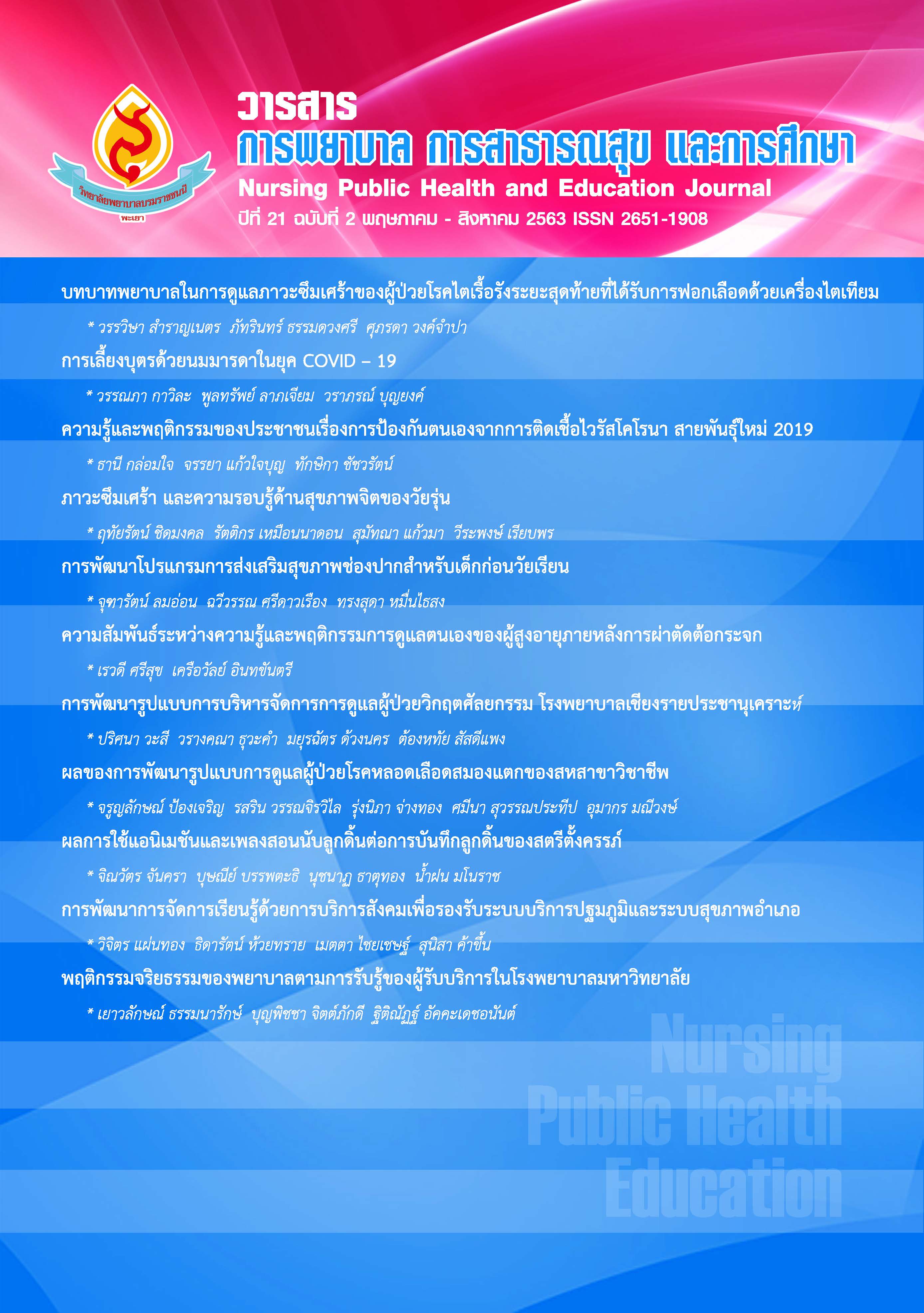การพัฒนาการจัดการเรียนรู้ด้วยการบริการสังคม เพื่อรองรับระบบบริการปฐมภูมิและระบบสุขภาพอำเภอ
คำสำคัญ:
การเรียนรู้ด้วยการบริการสังคม, ระบบบริการ, ระบบสุขภาพอำเภอบทคัดย่อ
การศึกษานี้มีวัตถุประสงค์เพื่อพัฒนารูปแบบการเรียนรู้ด้วยการบริการสังคมเพื่อรองรับระบบบริการปฐมภูมิและระบบสุขภาพอำเภอของนักศึกษาพยาบาลและศึกษาผลของการใช้รูปแบบการเรียนรู้ แบ่งเป็น 3 ขั้นตอน คือ ขั้นตอนที่ 1 การศึกษาสภาพการณ์ ได้แก่ ศึกษาและวิเคราะห์เอกสารที่เกี่ยวข้องกับแนวคิดรูปแบบและกระบวนการเรียนรู้ด้วยการบริการสังคมและศึกษาสภาพการณ์จริงเกี่ยวกับกระบวนการเรียนรู้ ขั้นตอนที่ 2 การออกแบบและพัฒนารูปแบบการเรียนรู้ด้วยการบริการสังคมและขั้นตอนที่ 3 การศึกษาผลการใช้รูปแบบการเรียนรู้ด้วยการบริการสังคม ผู้เข้าร่วมการศึกษาคือ นักศึกษา จำนวน 93 คน อาจารย์ จำนวน 12 คน และผู้แทนชุมชน จำนวน 12 คน รวบรวมข้อมูลโดยศึกษาเอกสาร การสนทนากลุ่ม การใช้แบบสอบถามและการบันทึกสะท้อนคิด วิเคราะห์ข้อมูลเชิงปริมาณโดยใช้ค่าเฉลี่ย ส่วนเบี่ยงเบนมาตรฐาน และ Paired t-tests วิเคราะห์ข้อมูลเชิงคุณภาพโดยการวิเคราะห์เชิงเนื้อหา ผลการวิจัยพบว่าการพัฒนารูปแบบการเรียนรู้ด้วยการบริการสังคมเพื่อรองรับระบบบริการปฐมภูมิและระบบสุขภาพอำเภอ ประกอบด้วย 6 แผนการเรียนรู้ แบ่งออกเป็น 5 ระยะ คือ ระยะที่ 1 ขั้นปฐมนิเทศ สร้างจิตสำนึก และอัตลักษณ์บัณฑิตที่พึงประสงค์ ระยะที่ 2 สำรวจข้อมูลและเตรียมโครงการ ระยะที่ 3 กิจกรรมบริการสังคมระยะที่ 4 การประเมินผลกิจกรรมบริการสังคม ระยะที่ 5 การคืนข้อมูลสู่ชุมชน ผลของการใช้รูปแบบการเรียนรู้พบว่ามีการปฐมนิเทศสร้างจิตสำนึกสามารถเตรียมความพร้อมได้ในการสำรวจข้อมูลและเตรียมโครงการในพื้นที่และพบว่าค่าเฉลี่ยคะแนนอัตลักษณ์บริการสุขภาพด้วยหัวใจความเป็นมนุษย์มากที่สุดคือด้านจิตบริการ (Mean = 4.33, SD.= .38) และมีคะแนนเฉลี่ยสูงกว่าก่อนใช้รูปแบบอย่างมีนัยสำคัญทางสถิติที่ระดับ .001 และพบว่าความพึงพอใจด้านชุมชนและแหล่งเรียนรู้มีค่าเฉลี่ยคะแนนมากที่สุด (Mean = 4.35, SD.=.38) ผลจากการวิเคราะห์ข้อมูลเชิงคุณภาพพบว่านักศึกษาสะท้อนผลการปรับเปลี่ยนกระบวนทัศน์ทางความคิดและมุมมองต่อตนเอง ส่วนอาจารย์และชุมชนสะท้อนผลการเรียนรู้ตนเองและชุมชน ควรนำรูปแบบการเรียนรู้นี้ไปต่อยอดในการพัฒนาอัตลักษณ์นักศึกษาอย่างต่อเนื่องตลอดหลักสูตรและขยายผลการใช้รูปแบบในเครือข่ายสถาบันการศึกษาพยาบาลอื่น
เอกสารอ้างอิง
จิราพร วรวงศ์, เนตรนภา กาบมณี, พรพรรณ มนสัจจกุล และ ธวัชชัย เขื่อนสมบัติ. (2019). การพัฒนารูปแบบการเรียนรู้สู่การเปลี่ยนแปลงโดยใช้ชุมชนเป็นฐานเพื่อเสริมสร้างอัตลักษณ์บริการด้วยหัวใจความเป็นมนุษย์ของนักศึกษาพยาบาล. วารสารวิชาการสาธารณสุข, 28 (ฉบับพิเศษ), 53-64.
ธนีนาฏ ณ สุนทร. (2561). USC-Service Learning Model: สู่การพัฒนานักศึกษาในยุค Thailand 4.0. วารสารครุศาสตร์, 46(3), 325-344.
ลิลลี่ ศิริพร, มกราพันธุ์ จูฑะรสก, ศุกร์ใจ เจริญสุข, เฟื่องฟ้า นรพัลลภ และ นิชดา สารถวัลย์แพศย์. (2557). รูป แบบการจัดการศึกษาแบบบูรณาการกระบวนการคิดอย่างเป็นระบบและจิตบริการด้วยหัวใจความเป็น มนุษย์ในสังคมพหุวัฒนธรรม สถาบันพระบรมราชชนก. วารสารการพยาบาลและการศึกษา, 7(1), 39-54.
สถาบันพระบรมราชชนก. (2554). คู่มือการดำเนินการเพื่อให้เกิดอัตลักษณ์บัณฑิต สถาบันพระบรมราชชนก พ.ศ. 2554. นนทบุรี: ยุทธรินทร์การพิมพ์.
สำนักงานเลขาธิการสภาการศึกษา กระทรวงศึกษาธิการ. (2561). แผนการศึกษาแหงชาติ พ.ศ. 2560 – 2579. กรุงเทพฯ: สำนักงานเลขาธิการ สภาการศึกษา กระทรวงศึกษาธิการ.
สมัชชาสุขภาพ. การปฏิรูปการศึกษาวิชาชีพด้านสุขภาพให้สอดคล้องกับความจำเป็นด้านสุขภาพในบริบทสังคมไทย [อินเทอร์เน็ท]. (2555), สืบค้นเมื่อ 30 พ.ย. 2562.จาก https://www.samatcha.org /sites/default/files/ NHA5_resolution3_H_ed_010756. pdf.
อัญชลีพร อมาตยกุล, วิไลพร ขำวงษ์, และพรรณิภา ทองณรงค์. (2557). การเรียนรู้สู่การเปลี่ยนแปลงในการจัดการศึกษาเพื่อผลิตพยาบาลชุมชน: กรณีศึกษาวิทยาลัยพยาบาลบรมราชชนนีขอนแก่น. วารสารวิจัยระบบสุขภาพ, 8, 375-381.
Billig, S. H. (2019). Service‐Learning. The Encyclopedia of Child and Adolescent Development, 1-11. DOI: 10.1002/9781119171492
Clevenger, C. M., & Ozbek, M. E. (2013). Teaching Sustainability through Service-learning in Construction Education. International Journal of Construction Education and Research, 9(1), 3-18.
Crowther, F.A., Ferguson, M. & Hann, J. (2008). Developing Teacher Leaders: How Teacher Leadership enhances School success. California: Corwin Press.
Eymard, A. S., Breaux, P., & Dozar, K. (2013). Transformative learning in nursing students through a service learning project with a vulnerable community. Journal of Nursing Education and Practice, 3, 35-43.
Fogarty, R. (2006). Problem - based learning and other curriculum models for the multiple intelligences classroom. New York: Lawrence Erlbaum Associates.
Freire, P. (1970). Pedagogy of the oppressed. New York, NY: Continuum
Gredler, M. E., & Shields, C. C. (2008). Vygotsky's legacy: A foundation for research and practice. NY: Guilford Press.
Jenkins, A., & Sheehey, P. (2019). A checklist for implementing service-learning in higher education. Journal of Community Engagement and Scholarship, 4(2), 6.
Kolb, D. A. (1984). Experiential learning, Englewood Cliffs. NJ: Prentice Hall.
Lave, J., & Wenger, E. (1991). Situated learning: Legitimate preripheral participation. Cambridge. MA: Cambridge University Press.
Maynes, N., Hatt, B. & Wideman, R. (2013). Service Learning as a Practicum Experience in a Pre-service Education Program. Canadian Journal of Higher Education, 43(1), 80-99.
Mitchell, T. D. (2005). Service – learning and social justice: Making connections, making commitments. UMI Proquest Digital. Dissertation: AAT 3193927.
Nuangchalerm, P. & Chansirisira, P. (2012). Community Service and University Roles: An Action Research based on the Philosophy of Sufficiency Economy. US-China Education Review, 2(4), 453-459.
Seitsinger, A. M. (2005, September - October). Service - learning and standards - based instruction in middle schools. The Journal of Education Research, 49(1), 54.
Simons, L., & Cleary, B. (2006).The influence of service learning on students personal and social development. College Teaching, 54(4), 307 - 319.
Tanner, D. L. (2007). Curriculum development theory in to practice (4thed.). New York: Pearson Merrill Prentice Hall.
Vygotsky, L.S. (1978). Mind in society: The developmental of higher psychological processes. London: Havard University Press.
Wiggins, G., & McTighe, J. (2005). Understanding by design (2nded.). Alexandria, VA: Association for Supervision and Curriculum Development.
Wileds, J., & Bondi, J. (2007). Curriculum development a guide to practice. New York: Pearson Merrill Prentice Hall.
ดาวน์โหลด
เผยแพร่แล้ว
รูปแบบการอ้างอิง
ฉบับ
ประเภทบทความ
สัญญาอนุญาต
ลิขสิทธิ์ (c) 2020 วารสารการพยายาล การสาธารณสุข และการศึกษา

อนุญาตภายใต้เงื่อนไข Creative Commons Attribution-NonCommercial-NoDerivatives 4.0 International License.



